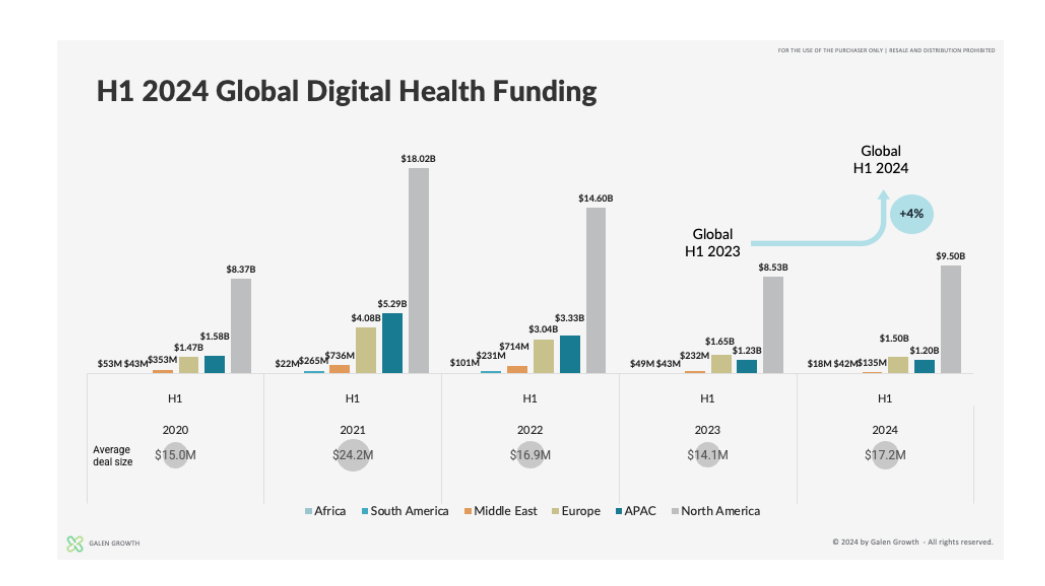Health tech investment is bouncing back significantly after many years of declines across the past few decades. In 2024, after reaching a depression point partly triggered by the impacts of the pandemic and economic uncertainties, health tech investment continues to recover noticeably.
The improvement evidence shows investors have far more faith in digital technologies to accurately serve their health challenges as diagnosed cases rise worldwide. This pattern transforms healthcare delivery worldwide, from AI-driven diagnostics to wearable devices.
Health Tech Investment Decline A Very Brief Overview

The health tech sector saw an enormous decline during the pandemic years. PwC’s 2023 HealthTech Report stated that investments in health tech saw a near 40% fall in venture capital funding during 2022. Economic instability and inflationary concerns coupled with regulatory issues led to investors pulling out of this investment channel.
However, this gave a strong foundation for revival, and by the beginning of 2024, the sector is now offering positive growth owing to improved venture capital, coupled with private equity investments.
Recovery in 2024: Indicators
Health tech sector surges back: Funding of the sector rebounded with a bang in 2024. According to PitchBook, investments in health tech increased by 30% alone in Q1 2024. The drivers of growth are seen in the adoption of AI in healthcare, expansion in the use of wearable devices, and demand for telemedicine services. Some of these innovations relate to wearable health trackers, predictive analytics, and diagnostic tools all powered by AI.
Know More: How Liquid Foundation Models Are Transforming AI Architecture
The public market activity also captures this recovery. Several first-half 2024 successful IPOs prove health tech is once again an attractive investment destination. In other words, private and public market investors have long-term confidence in this space.
Health tech investment shows signs of recovery in 2024
Silicon Valley Bank reports that funding in the first eight months of 2024 has already exceeded pre-pandemic levels. However, high valuations from 2021 are still impacting the market pic.twitter.com/CI90E3d55G— Sean Elwell (@SeanElwell24) October 16, 2024
Why Health Tech Investments Are Recovering
There are very few major factors driving this recovery: technological advancement, regulatory support, and changing consumer demand.
AI and Machine Learning Innovations: AI is transforming healthcare by providing predictive analytics, enhanced diagnostics, and better decision-making. With the aid of AI, medical data of greater and massive proportions can be analyzed more accurately for correctness in diagnosis and can enable diseases to be detected at an earlier stage of the process. McKinsey states that the United States healthcare system would likely save up to $150 billion each year as early as 2030 due to another of the reasons why investing here is so attractive.

Government Support: Leaders and policymakers from all around the world are realizing the need for digital health solutions. For instance, CMS, an authoritative body in the U.S., has further extended support and coverage by telehealth services. Such initiatives provide an enabling environment for health tech startups to focus on innovation and investment.
Digital Health: Increasing Consumer Demand Improved, efficient health care is accessible and available to the rising consumer. According to a survey conducted by Statista in 2024, nearly 70% of US consumers stated that they require online consultations or digital health tools. This trend toward remote healthcare choice is compelling investors to infuse funds into telemedicine and digital health companies.
Impact on the Healthcare System and Patients
Investments in health technology are changing the healthcare landscape in several key ways. One of the main impacts is better patient outcomes. AI-based diagnosis and real-time health monitoring help the detection of diseases much earlier than when traditional methods are put to use.
Another way through which digital health solutions are impacting the saving of cost in health is through a reduction in healthcare costs. Because of remote patient monitoring technologies, it is now possible for people to stay in their comfort apartments and take care of their health without having to spend so much on inpatient visits and hospitalizations. The Statista Health Tech Report anticipates the global digital health market will grow to $380 billion by 2025, and most of that will be accounted for by cost-saving technologies.
Challenges and Risks

Health technology requires the handling of very sensitive information pertinent to individual patients; hence, companies have to deal with a complex network of regulations such as Europe’s GDPR. Still, HealthITSecurity informs that healthcare-related data breaches will increase by 10% in 2023, which may pose security risks for investors to worry about.
Market saturation is another challenge. With the rapid increase in the emergence of health tech start-ups, the competition in the area has increased. In some market segments, competition may become saturated, and it becomes very difficult for new entrants to get funding or gain recognition.
Future Outlook for Health Tech Investments
Finally, the prospects for health-tech investments are quite bright. The industry is expected to witness a healthy and accelerated growth trajectory in the near term. For instance, McKinsey Global Institute envisions that the global health-tech market will touch $280 billion by 2026. Future adoption of AI, telemedicine, and digital health solutions is likely to ensure the industry remains an attractive sector for investment.
Future healthcare is going to be full of emerging innovations. These include health wearables and blockchain for health data security. For example, with more people embracing the use of wearables, it will advance the management of chronic disease in that real-time monitoring and early intervention in care will save so many hospital visits.
Conclusion
By 2024, it is evident that health technology is slowly but surely recovering. In some ways, it has gotten back on the right track with government support and growing consumer demand coupled with innovative technologies. Investments are growing, and this is evidence of the sector’s revolutionizing potential in healthcare. Of course, with some key challenges like regulatory concerns and market saturation, the overall outlook for health technology is undoubtedly favorable.



